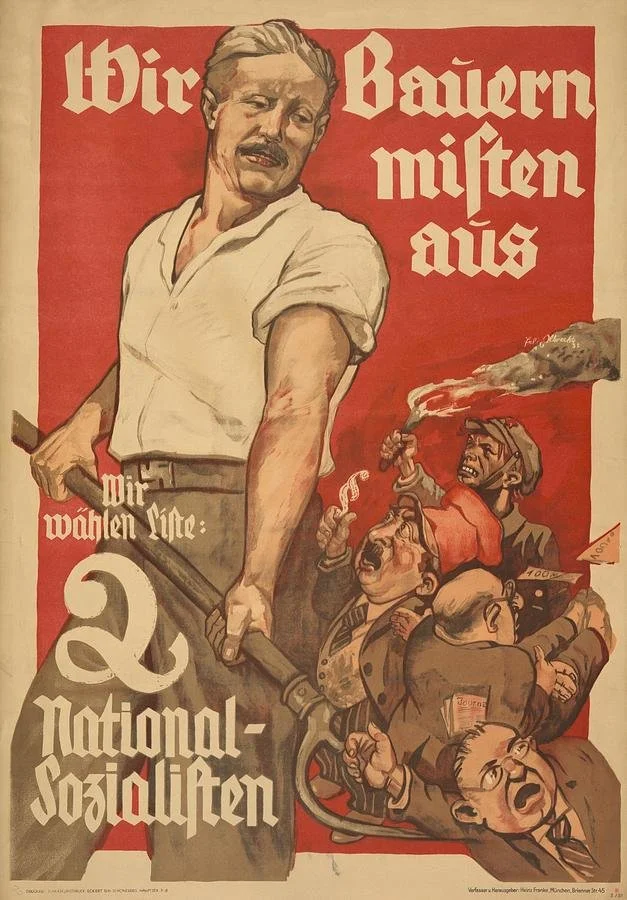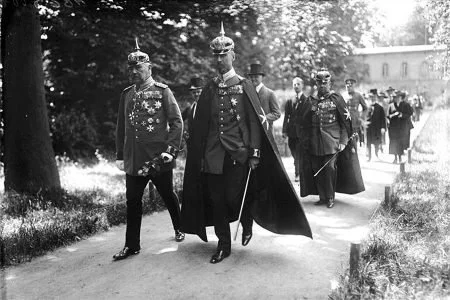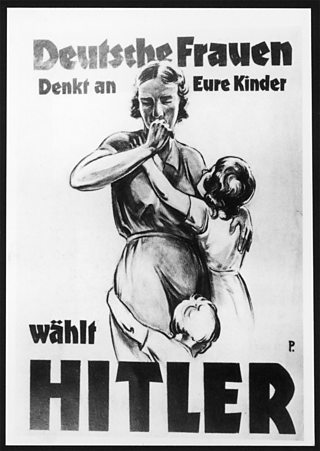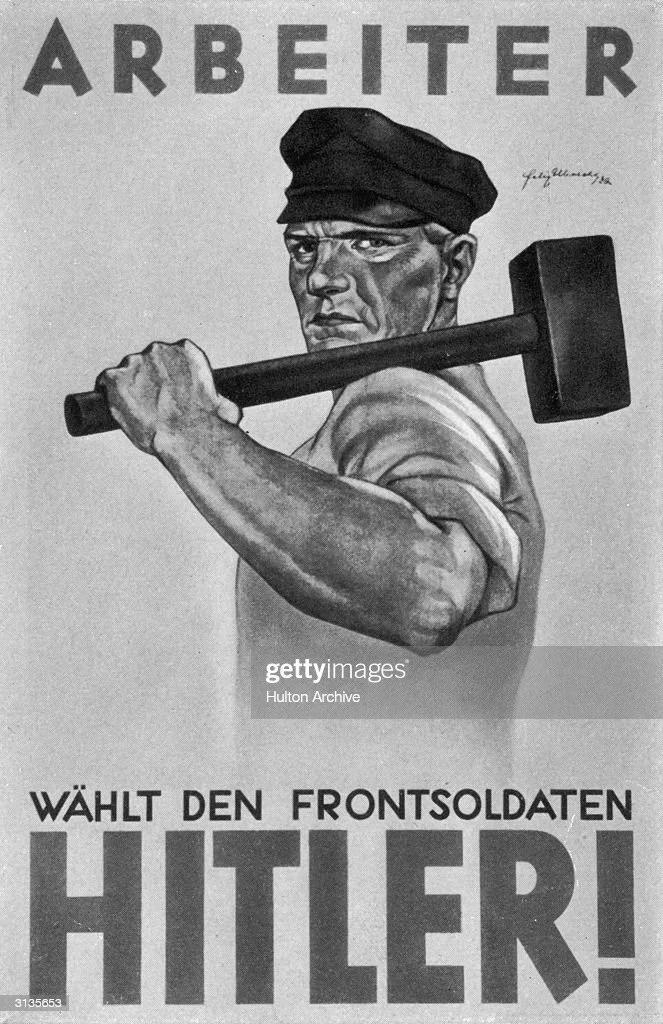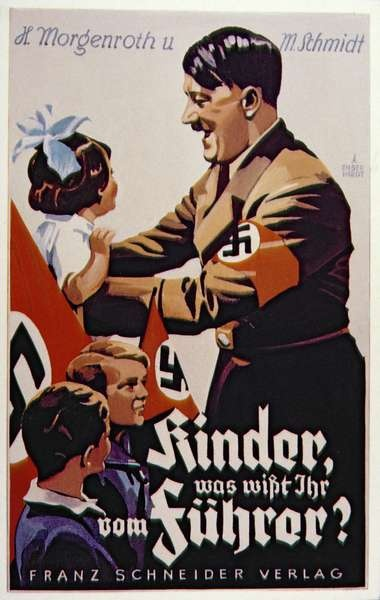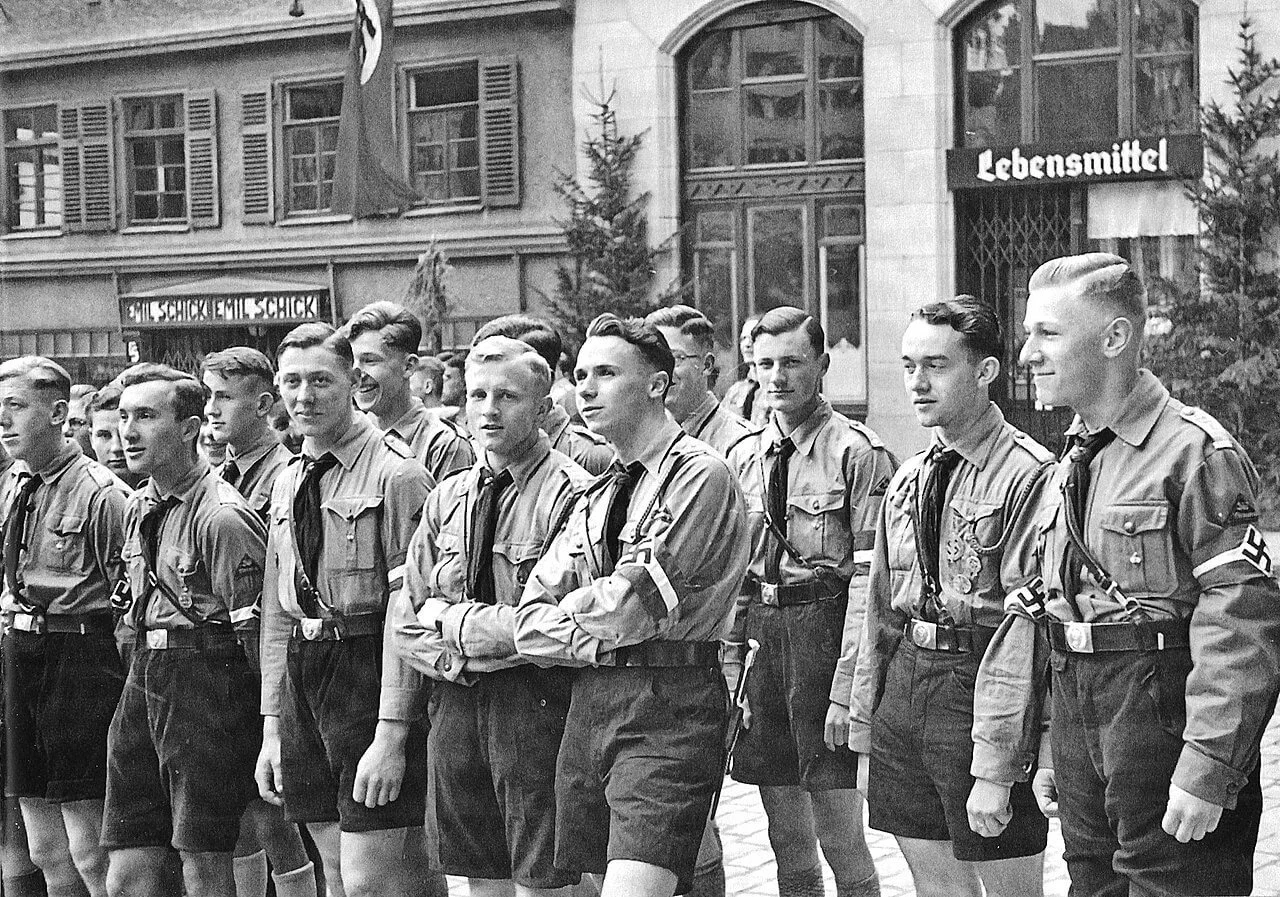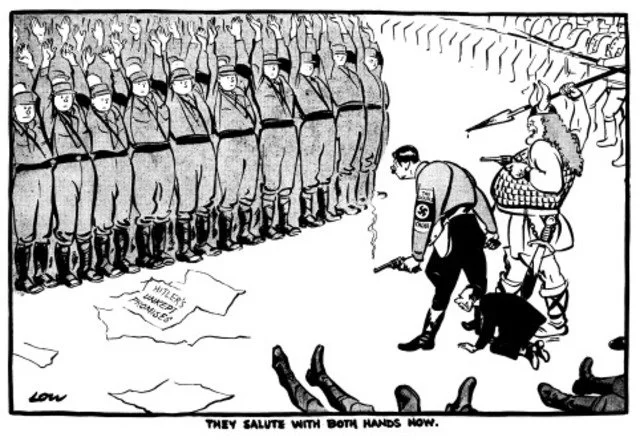Who voted for the Nazi's?
The Nazi movement displayed great skill in appealing to a variety of emotions, and appealing to particular groups.
Many in rural Germany supported the Nazis because of the promise of agrarian reform.
To the unemployed there was the promise of relief.
To the army there was the promise of rearmament.
Industrialists and business interests saw the Nazis as the only group that actively opposed the communists.
Young people were attracted by the idealism of the movement and the hope of a better Germany.
Nationalists supported the Nazi pledge to restore German honour and greatness.
The middle class, which had suffered through inflation and the Depression, saw the Nazis as promoting middle-class values and returning stability, order and security.
Key supporters: The Junkers and political elites. (Thought Co)
Support for Hitler was strong among the upper classes. Large non-Jewish businesses initially supported Hitler to counter their fear of communism. The Nazi’s also received support from wealthy industrialists and large companies who supported rearmament and benefitted from the remilitarisation of the economy. Hitler’s solution to land reform was also popular. His plans for an expansion in the east, not re-settling workers on Junker lands (a solution favoured during the Weimar government) was preferable. Nazis like Goering were able to use their backgrounds to please the aristocratic elements in Germany. Young male aristocrats flooded to the SS, reflecting Himmler’s desire for an elitist medieval system and his faith in the old families.
To do: Letter to your friends
Write a letter to your aristocratic friends explaining why you are going to support Hitler
Key supporters: The Middle Classes. (Republic to Reich, Mason. 2018)
In German society the middle class represented that large group between the traditional landed aristocracy (The Junkers) and the growing numbers of the German working class. Within the middle class there was a growing hostility and fear of the working class and organised labour. The Depression deepened this class antagonism. Middle-class Germans had suffered a loss of income and they were suffering a loss of status. In 1913 a German teacher received 10 times the wage of a coal miner. In the 1920s they received only twice the wage. After 1927 the Nazis began to focus their policies and propaganda to appeal to the interests and fears of the German middle class.
Most were attracted by the aggressive line the Nazis took against the left, and particularly against the communists. Many were worried about social disorder and disintegration, they were attracted to the Nazi promise of a return to order and traditional German values and the rejection of the Weimar system. They also supported the appeal to nationalism, the opposition to the Treaty of Versailles, and promises of economic action and change. Nazism became the authentic voice of the small townsperson, the anxious official, the small-business operator and the civil servants and professionals who had lost out in status and income to other groups. The Nazi Party was made up of and led by people like this. Nazi leaders articulated their fears and desires and promised to end the crisis.
To do: Communist newspaper article
Write an article (150 words) for a communist newspaper explaining the support of German the middle class for the Nazi party.
German women, think of your children. Vote Hitler.
Key supporters: Rural Regions. (Power and Authority in the Modern World, Webb, 2018)
The Nazis won significant electoral support in the rural and farming communities. As early as 1928 the depressed rural areas of northern Germany were turning to the Nazis, and this support soon spread to the smaller cities and towns across northern Germany. The Nazis were the only political party to offer hope to the long-suffering German farmers. The steady decline in world commodity prices meant that German agriculture had been depressed since the mid-1920s. The result was an increase in the level of agricultural debt and a decline in living standards for the rural population. The Nazis attacked high interest rates, and promised to subsidise farming. Nazi ideology preached the importance of the farming community as a vital part of the nation. Hitler believed that members of the farming community were, racially, the most pure, because they were away from the corrupting influences of the great cities (Where Nazi support was significantly weaker). When the Nazis came to power they implemented policies to preserve the existence of the farming communities and the bond between what they called the Blut und Boden (blood and soil).
To do: Radio interview
Write a radio interview dialogue between a reporter and a farmer explaining who they will be voting for in the upcoming German elections.
Background briefing: Hitler becomes Chancellor
Month of Destiny: January 1933 - The Nazis were not a sure thing.
“The amazing thing about my life,” Hitler said to Brüning in February 1933, “is that I’m always rescued just when I myself have given up.”
The Nazi Party prospects at the beginning of 1933 looked anything but rosy. Hitler’s party was in deep crisis, with many members feeling deflated and resigned. Dissatisfaction with the party leadership was threatening to make the SA explode. Even his strongest supporters thought that the party had probably peaked in popularity. The Nazis appeared further away from power than they had been at the start of 1932.
On New Year’s Eve 1932, Hitler abandoned all pretence of middle-of-the-road respectability. The fanatic, anti-Semitic beer cellar, rabble rouser re-emerged, with his obsessive, aggressive, pseudo-religious and convoluted language:
“In almost all states of the world, the international Jew as an intellectual conspirer conducts the battle of the deficiently gifted race against culture – and therefore against the talent of a higher breed that creates and secures human life, whose capacity to resist has been exhausted by liberalism. In Russia, the Jewish intellectual leadership of world revolution had already done its destructive work, to infect the rest of the world …”
He reiterated his determination to refuse compromise in any form stating, “he would not sell the first-born child of our movement for the pittance of being allowed to participate, without power, in a government.” He promised to, “fight down to his last breath against battering the proudest and greatest uprising of the German people for a couple of ministerial seats.” He was fixed on the all-or-nothing strategy and the Nazis seemed headed for political marginalisation.
Four weeks later Hitler was Chancellor of Germany.
From: Hitler: A Biography, Volume 1, Ascent, Ullrich, V, 2016.
Hitler becomes Chancellor
Belair Bugle article - German democracy is dead.
“Hitler, who for so many years insisted on ruling by himself, has been yoked, hemmed in or constrained (take your pick) between Papen and Hindenburg.”
Swiss envoy to Berlin, Paul Dinichert after hearing the news of Hitler’s appointment:
Task
Write a 300 word article explaining to the good people of Belair how Hitler quickly escaped the constraint of Papen and Hindenburg.
Refer to the five events (below) that followed Hitlers ascension to power.
Extra: Was there a point after 1933 where the Nazi rise to power could have been stopped?
Event 1. Hitler becomes Chancellor – 30 January 1933 (History.com)
In a series of complicated negotiations, ex-Chancellor Franz von Papen, backed by prominent German businessmen and the conservative German National People’s Party (DNVP), convinced Hindenburg to appoint Hitler as chancellor, with the understanding that von Papen as vice-chancellor and other non-Nazis in key government positions would contain and temper Hitler’s more brutal tendencies..The year 1932 had seen Hitler’s meteoric rise to prominence in Germany, spurred largely by the German people’s frustration with dismal economic conditions and the still-festering wounds inflicted by defeat in the Great War and the harsh peace terms of the Versailles treaty. A charismatic speaker, Hitler channelled popular discontent with the post-war Weimar government into support for his fledgling Nazi party. In an election held in July 1932, the Nazis won 230 governmental seats; together with the Communists, the next largest party, they made up over half of the Reichstag.
Event 2. The Reichstag Fire 28 Feb 1933
On the 31 January 1933, Hitler, conscious of his lack of a majority in the Reichstag, immediately called for new elections to try and strengthen his position. The Nazis aimed to increase their share of the vote so that they would have a majority in the Reichstag. This would allow them to rule unopposed and unhindered by coalition governments.
Over the next two months, they launched themselves into an intense election campaign.
On 27 February 1933, as the campaign moved into its final, frantic days, the Reichstag, the German Parliament building, was set on fire and burnt down. An atmosphere of panic and terror followed the event.
This continued when a young Dutch communist, Van der Lubbe was arrested for the crime.
The Nazi Party used the atmosphere of panic to their advantage, encouraging anti-communism. Göring declared that the communists had planned a national uprising to overthrow the Weimar Republic. This hysteria helped to turn the public against the communists, one of the Nazis main opponents, and 4000 people were imprisoned.
The day after the fire, Hindenburg signed the Emergency Decree for the Protection of the German People.
Event 3. The Enabling Act: March 23 1933 (Law to Remove the Distress of the People and the State)
Article 1. National laws can be enacted by the Reich Cabinet as well as in accordance with the procedure established in the Constitution.
Article 2. The national laws enacted by the Reich Cabinet may deviate from the Constitution as long as they do not affect the position of the Reichstag and the Reichsrat. The powers of the President remain undisturbed.
Article 3. The national laws enacted by the Reich Cabinet shall be prepared by the Chancellor and published in the Reichsgesetzblatt [Reich Legal Gazette].
Article 4. Treaties of the Reich with foreign states which concern matters of national legislation do not require the consent of the bodies participating in legislation.
Article 5. This law becomes effective on the day of its publication. It becomes invalid on April 1, 1937 or if the Reich Cabinet is replaced by another.
Event 4. Night of the long knives - June 30 to July 2, 1934
Hitler feared that German Pres. Paul von Hindenburg could stop Hitler by handing power over to the Reichswehr (The German Army). Hitler, knowing that military strength was necessary for his foreign policy and that antagonising the generals could be fatal to himself, decided to sacrifice Röhm.
Hitler also feared that paramilitary SA had become too powerful, under Rohm the organisation had grown to 3 million men. It was alleged that Röhm was plotting a putsch, Rohm and many more leaders of the SA were shot or disappeared.
Also killed that night were hundreds of other perceived opponents, including the last chancellor of the Weimar Republic, Kurt von Schleicher and Gregor Strasser, who until 1932 had been second only to Hitler in the Nazi Party
Event 5. Gleichschaltung - coordination (Ushmm.org)
The Nazi Party came to power in 1933 and quickly began trying to control all aspects of society. This internal consolidation of power to remake Germany as a Nazi state was known as Gleichschaltung. The term is a German word that means “coordination” or “synchronization.” Under Gleichschaltung, German political, social, and cultural life were rearranged to serve Nazi goals.
Every arm of government council, state and federal was purged of non Nazi members.
Every club, volunteer organisation, association, choir, sports club was brought under Nazi control – the entire fabric of society was Nazified.
The Civil Service a vast organisation which included teachers, uni staff, judges, bureaucrats were purged.
All Social Democrats, Jews, liberals, some Catholics and conservatives too were ousted.
Fearing unemployment, Nazi Party membership grew to over 2m by end of 1933.
Sources - Night of the Long Knives
Privately, the Night of the Long Knives had shaken Hitler and he forbade any mention of the events in his presence. Publicly, the event not only reaffirmed the brutality of the regime but was also a major step in further strengthening Hitler's power base. In one move Hitler had put down the threat of the SA and satisfied the German army.
"The blood bath of 30 June 1934, wrote British historian AJP Taylor, washed away the last scruples. It was the clear assertion that there was no turning back." It was a view shared by Victor Klemperer, who kept a diary for much of the Third Reich. The horrible thing, he wrote, 'is that a European people has delivered itself up to a band of lunatics and criminals and continues to tolerate them."
Sources Analysis Answer Guide
Don’t forget: Quote often and begin your response with name of the author, not the Source number. Put the source number in brackets at the end of the quote/paraphrasing.
For example:
This is supported by Jones who states that 'History students would be more popular at parties if they used this method.' (Source 3)
SACE Sources advice
More successful responses:
were well-structured
contained relevant evidence from sources when required.
Less successful responses
provided responses without reference to any evidence from the source
stated that sources are limited without reasoning
did not address the nature of sources clearly
did not explain how the nature and origin of the sources were a strength or limitation
did not include of the source in the response.
Source 1. Hitler speaks after the blood purge of June 1934. Joachim Fest, 1973
'In the state there is only one bearer of arms, and that is the army, there is only one bearer of the political will and that is the National Socialist Party. I was responsible for the fate of the German people and thereby I became the supreme judge of the German people I gave the order to shoot the Gang leaders of this treason... And let it be known for all time to come that if anyone raises his hand to strike the state then certain death is his lot.
Questions
Use evidence from the source to charecterise the relationship between the German Army and the Nazi's after the Night of the Long Knives. (2)
Source 2. A message to the German army from the Defence Minister, General von Blomberg, 1 July 1934
The Führer with soldierly decision and exemplary courage has himself attacked and crushed the traitors and murderers. The army, as the bearer of arms of the entire people, far removed from the conflicts of domestic politics, will show its gratitude through devotion and loyalty.
Questions
2. The army had always been an influential and independent force in the German state. In what way does Blomberg's statement indicate that this could be about to change? (2)
Source 3. President von Hindenburg's telegram to Hitler, 2 July 1934
From reports submitted to me I see that you, through your determined action and gallant personal intervention, have stopped treason in the bud You have rescued the German people from a great danger. For that I express to you my heartfelt thanks and sincere appreciation
With best wishes
von Hindenburg
Questions
How does Source 3 support Source 2? (4)
Extra: why would the Reichswehr have given silent support to the actions on the Night of the Long Knives?
Source 4. ‘They salute with both hands now’.
Questions
Explain the symbolism of the swastika armband in Source 4. (1)
Identify the group in the top-night corner of the cartoon in Source 4.(1)
In what way does the cartoon support the statement made by Hitler in Source 1? (2)
How useful is the cartoon in helping us to understand the events that occurred during the Night of the Long knives? (4)
Source 5. The War against the Jews, 1933–1945. L. Dawidowicz, 1982.
'The massacre was misunderstood within Germany as well as outside the nation. Instead of realizing that the country was being run by a gang of criminals, many Germans believed that the purge of the SA represented Hitler’s wish to halt the arbitrary terror of the SA in the streets and to restore a measure of legality to the country.
Questions
According to the source, how were the events of the 30th of June misunderstood in Germany and the International community? (2)
Refer to all of the sources to respond to the following proposition.
‘The night of the long knives was not supported by the German people or the Reichswehr’. (5)
